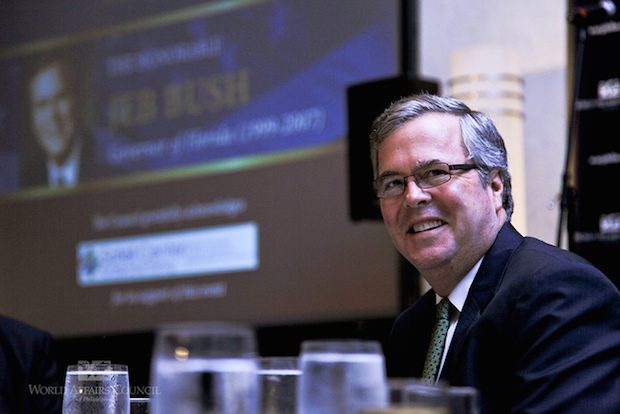Jeb Bush, Realist?

Jeb Bush has been asked whether he favors regime change in Iran. So far, he hasn’t answered publicly.
A Time reporter quoted Bush as saying, “I’ll have to give that some thought. That’s a good question.”
Politico reported that Bush “also demurred when asked whether he’d put tougher sanctions on Russia or pursue a policy of regime change in Iran, saying he’s not yet a candidate.”
It’s wise not to make too much of this, as some have exaggerated the significance of there being a token realist presence on the former Florida governor’s hypothetical foreign-policy team. Perhaps Bush is simply being cautious in his rhetoric. Maybe it means nothing at all.
Given the trajectory of Bush presidencies, the case for optimism is weak. Jeb has been quoted as suggesting the Obama administration should have pursued regime change rather than an opening with Cuba, likening diplomacy with the geriatric communist dictators to hoping for a breakthrough with the ayatollahs in Iran.
Connect the dots yourself.
Nevertheless, prominent Republicans haven’t been shy about advocating regime change in Iran, even if they’ve been reluctant to admit that would likely entail military action closer in scope to the Iraq War than Bill Clinton’s bombing of Saddam Hussein’s weapons sites.
“The goal of our policy must be clear–regime change in Iran,” freshman Arkansas Sen. Tom Cotton has been quoted as saying. “We cannot and will not be safe as long as Islamist despots rule in Iran.”
Cotton has denied this means pre-emptive war. But he is in favor of bombing Iran’s nuclear sites. President Clinton, Cotton’s fellow Arkansan, attempted a combination of bombing and indirect support for regime change in Iraq. There was a pre-emptive in invasion within five years.
“Instead of focusing on overthrowing Assad or aiding his enemies, we should be vigorously pursuing regime change in Iran,” former UN Ambassador John Bolton wrote last year. “As Alexander Haig once put it, ‘go to the source.'”
South Carolina Sen. Lindsey Graham, like Bolton mulling a longshot bid for the 2016 Republican presidential nomination, has been in favor of regime change since at least 2009.
Graham too has emphasized support for freedom movements in Iran rather than preventive war, but he’s also backed an authorization for the use of military force against the country.
While we should be skeptical that this understandable desire to see Iran ruled by a less loathsome government won’t morph into advocacy for an Iraq-like war, we should take these three gentlemen at their word that they want regime change.
Is that true of every Republican in the 2016 field making hawkish noises, either defending the Iraq War or appearing open to a repeat in Iran?
Ronald Reagan defended the Vietnam War as a “noble cause” (a phrase he repeated shortly before leaving office). He joked about outlawing Russia forever and commencing bombing within five minutes.
In 1974, Reagan confronted critics who said he would take the country back to William McKinley’s administration. “Of course, I never found that was so bad,” he shot back. “Under McKinley we freed Cuba.”
Yet as president, Reagan did not launch a preventive war for regime change in Cuba or bomb the Soviet Union. He conspicuously avoided Vietnam-like military adventures.
Some Republicans who are today saying similar things today may indeed have learned lessons from the Iraq War. It is difficult to have much confidence in this possibility, however, for three reasons.
The first is that Reagan’s fervent anti-communism and more hawkish impulses were balanced with other inclinations, such as his belief that nuclear weapons were immoral. “To rescue Reagan from many of today’s so-called Reaganites may help rescue America from the pride of its present follies,” wrote the late academic John Patrick Diggins in his book on the 40th president.
Secondly, the foreign-policy team advising Reagan was more diverse too, especially on the question of when to use military force. The hawks–many of them fitting Diggins’s description of being “today’s so-called Reaganites”–didn’t like these advisers or the occasions Reagan heeded their counsel even then.
But there wasn’t quite the same expectation that the biggest disagreement among GOP foreign-policy hands should be over the merits of democracy promotion or the desirability of war with Iran as opposed to Syria.
Finally, many of today’s Republican presidential candidates remember only the most hawkish aspects of Reagan’s foreign policy. They seek to emulate an oversimplified version of those policies.
That’s why it is now a mild surprise when a leading Republican presidential candidate declines the opportunity to endorse yet another Middle East war before his campaign is officially launched.
W. James Antle III is managing editor of the Daily Caller and author of Devouring Freedom: Can Big Government Ever Be Stopped?
Comments